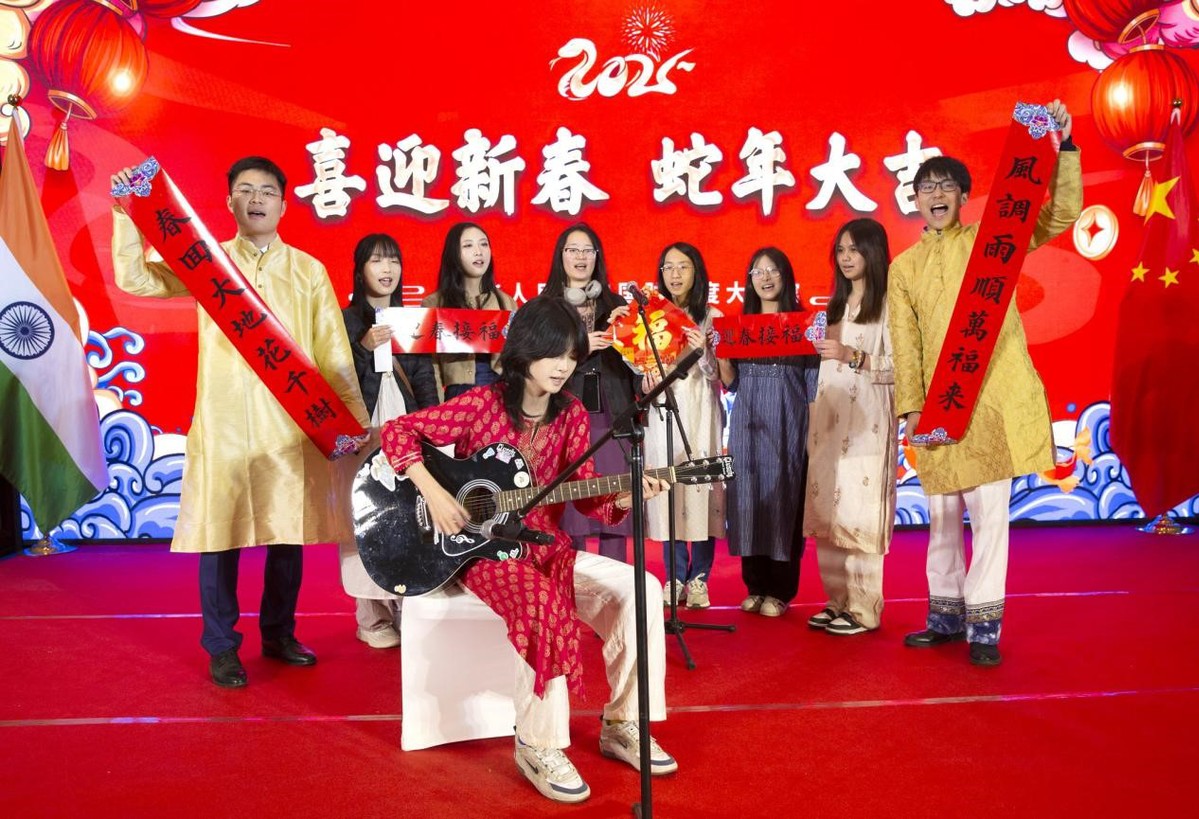
A reception to celebrate the Chinese New Year features a number of Chinese performers in New Delhi on Jan 21, 2025. The reception was hosted by the Chinese embassy in India. [Photo provided to chinadaily.com.cn]
A glittering cultural event highlighted hopes for mutually beneficial development amid festive activities in New Delhi on Jan 21 as the Chinese embassy in India hosted the reception to celebrate the Chinese New Year.
Addressing the gathering, Chargé d'Affaires of the Chinese Embassy in India, Wang Lei reiterated China's hopes for win-win cooperation with India and mutual development.
"We stand ready to work with the Indian side, in the spirit of looking to the future and pursuing win-win cooperation, to invest our valuable resources into development and revitalization, and place the border issue in an appropriate position within bilateral relations," Wang said.
Chinese Ambassador in New Delhi Xu Feihong who was not able to attend the reception, noted the attendance of representatives from Indian government, political parties, diplomatic corps, enterprises, think tanks and media in a post on X. Chinese New Year of the Snake falls on Jan 29.
As this year marks the 75th anniversary of the establishment of diplomatic relations between China and India, Wang said there will be "dozens of celebratory activities".
"We … look forward to your participation. Together, we will write new stories of China-India friendship," he added.
Wang recalled that during the meeting between the two countries' top leaders in Kazan, Russia, last year, the two sides had agreed to step up strategic communication, safeguard peace and tranquility in the border areas, and "strive to bring the bilateral relationship back to the track of stable development at an early date".
"The two leaders viewed China-India relations from a strategic and long-term perspective, and pointed the way forward for the improvement and development of bilateral relations at a critical moment," Wang said.
He also noted that the 23rd meeting of the Special Representatives for the China-India Boundary Question was held in Beijing last December. Based on the important common understandings reached by the two leaders, both sides had substantive discussions on the China-India border issues and agreed on a six-point consensus.
"We should jointly maintain peace and tranquility in border areas, forge a path for the neighboring countries to coexist in harmony, and create a better future together," Wang said.
Economic and trade exchanges have become closer, he said, adding that trade volume reached $126.6 billion in the first 11 months of 2024, registering a year-on-year growth of 1.9 per cent.
People-to-people exchanges have seen rapid growth, and the Chinese Embassy and Consulate Generals in India issued 280,000 visas to Indians last year.
China will remain a force for peace, unity, openness, justice and inclusiveness, and work together with other countries to create a better future for the world, Wang said.
At the reception Chinese artists delighted the audience, comprising both Chinese and Indian nationals, with their splendid dance-and-music performances. The guests also had the opportunity to taste sumptuous dumplings and other popular Chinese delicacies.
As two ancient civilizations, major developing countries and emerging economies, China and India should focus on development and cooperation, Chinese foreign ministry spokesperson Guo Jiakun said on Jan 21.
Guo was responding to India's External Affairs Minister Subrahmanyam Jaishankar's recent remarks that the India-China relationship is trying to disentangle itself from the complications arising from the post-2020 border situation and more thought needs to be given to the longer-term evolution of the ties.
"We need to view and handle the bilateral relations from a strategic height and long-term perspective, bring the relations back to the track of healthy and stable development, and find the right path for big, neighboring countries to live in harmony and develop side by side," Guo told a media briefing in Beijing.
On Jan 18, Jaishankar said in Mumbai that "misreadings" by past policymakers, whether driven by "idealism or absence of realpolitik", had helped neither cooperation nor competition with China.
That has changed in the last decade, Jaishankar said, adding that mutual trust, mutual respect and mutual sensitivity should remain the basis of the relationship between the two sides.